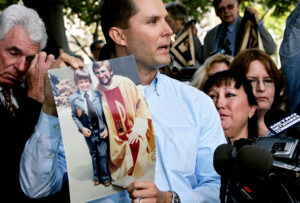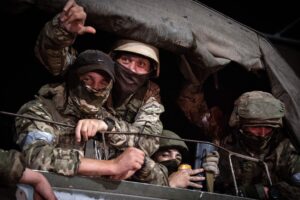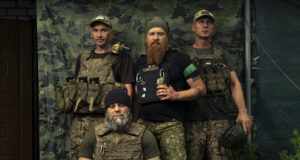As the world watched the Wagner mercenaries make good on their mutinous threats and advance on Moscow last month, Vladimir Putin shot them down in a television address. Spitting with rage and refusing to utter Prigozhin’s name, he said that the leaders of the rebellion had “betrayed their country, their people”. Amid his invective of treachery and treason, Putin levelled another charge: apostasy.
There’s no more defining act of the latter years of Putin’s reign than the invasion of Ukraine, where the Russian leader’s justification for the war has been as moral as it is material. In Putin’s address to the nation on the eve of the invasion last year, he spoke of needing to protect Russia from dangerous Western influences which were seeking to “destroy our traditional values, and force on us their false values that would erode us, our people, from within”. As with his charge against Prigozhin, it was a pointed signal to people both inside and outside of Russia that, to him, this was an issue far greater than mere borders. And this invocation of cosmic transgressions speaks to a deeper change happening within Russia, a tightening of the bond between the political and the spiritual.
In spiritual terms, the merger of Orthodox Church and Russian state began long before Prigozhin launched his ill-fated mission. It’s a process that was memorialised in 2020, when the Cathedral of the Armed Forces of Russia opened in Moscow to commemorate the 75th anniversary of Soviet victory over Nazi Germany on the Eastern Front. The stained-glass mosaics on the imposing building fuse saints and military heroism, while its floors are made of melted-down trophies seized from the Nazis; every time a Russian walks on them, he is “symbolically delivering a blow to the fascist enemy”. The proportions of the church are deliberately encrypted with numerology: the height of 14.18 metres, for instance, corresponds to the 1,418 days of what Russians call the Great Patriotic War. It is, as Aris Roussinos described it, “a statement of Russia’s neo-traditionalist state ideology for the next century”.
A wartime leader calling on higher powers to fortify a nation is hardly new, but Putin’s regime appears to be increasingly leaning into the mystical as a source of its legitimacy. Last autumn, the bones of legendary commander Grigory Potemkin — Catherine the Great’s consort — were returned to Russia from the fiercely contested Ukrainian city of Kherson. The remains of Prince Alexander Nevsky, the great warrior-saint of medieval Rus, have also been handed over from the St Petersburg’s Hermitage Museum to the Orthodox Church. Then, in May this year, the icon of Saint Seraphim of Sarov, a widely venerated 18th-century hermit and confessor, was flown over parts of Russia susceptible to Ukrainian advances, in an apparent bid to ward off potential drone attacks. Putin’s message to the nation would seem to be that its traditions are its strength.
This is a country that is not yet fully mobilised, but firmly on a war footing, and one where people have been told that they must endure and suffer for the good of the motherland. The message is increasingly clear: Russia is not simply engaged in a physical battle, but a celestial one.
It was around 10 years ago that Putin began drawing heavily on Russia’s religious heritage for geopolitical reasons. This is, perhaps not coincidentally, around the time that Putin started tinkering with his borders in Crimea. “He was trying to position Russia as this geopolitical ‘democracy’ that’s different from Europe and the West because [of its] religious values,” explains Telly Papanikolaou, professor of theology.
“The Russian Orthodox Church has backed itself into becoming nothing more than a department of the foreign ministry,” he says, adding that the church is being used as “a soft-power tool” of the regime. And Putin has squarely aimed his rhetoric at those in the West who believe that “traditional values” are under threat from abortion, gay marriage and women’s rights. But in labelling the mutiny as apostasy, Papanikolaou believes that Putin is looking inside rather than beyond his borders, attempting to “weaponise” religious heritage to eradicate dissenters.
When it comes to using the Russian Orthodox faith as a political tool, the state has a deeply fraught history. The church was central to Russian life before the Bolshevik revolution, before the Soviet state attempted to completely decouple Christianity from Russian identity. But it was impossible to unwind such a rich history. Earlier this year, declassified Swiss documents revealed that Patriarch Kirill, who has headed the Orthodox Church since 2009, worked for the KGB in the Seventies, suggesting a closer bond between church and state than is generally recognised in histories of the Cold War. And as the collapse of communism saw chaos reign, many Russians returned to religion.
During those years, however, the Orthodox Church faced serious competition for the first time. Western missionaries — labelled by the then-Patriarch as “spiritual colonisers” — had long been obsessed with reaching the godless communists. As a result, some groups, such as Jehovah’s Witnesses, were persecuted by the state before being banned entirely.
The spiritual remit of the Putin era favoured the Orthodox faith, but was careful not to alienate the broad collection of religions in the Russian Federation, co-opting the Islam of the Caucasus as well as Judaism and Buddhism. Religious leaders all got the same message: domesticate your boys and be a part of the state apparatus, and you’ll be fine. Crack down on the gays and western decadence, and you, too, can be a patriotic Russian. Today, that extends to the war effort, which is a highly national project.
In fact, according to a paper published by Kristina Stoeckl last year, the concept of “spiritual security” has become Kremlin doctrine. It all began in the year 2000 — shortly after Putin came to power — around the same time that the European Union’s Charter of Fundamental Human Rights enshrined “right to freedom of thought, conscience and religion”.
Spiritual security became a rival to the security offered by Nato and the EU, and in time, Stoeckl says, “has become the justification for Russia’s war on Ukraine and, in an enlarged perspective, with the West”. The amendment of the Russian constitution in 2020, Stoeckl notes, saw it launch a “Declaration of Values”, in which spiritual ideals were emphasised, in speeches by academics as well as religious figures. In the 2021 update to the document, the word “spiritual” was mentioned 24 times. Stoeckl believes that this is all part of giving the FSB, successor to the KGB, a “moral mission”.
The marriage of church and secret service was consummated in 2002, when an Orthodox Church was consecrated within the infamous Lubankya headquarters of the FSB by none other than Nikolai Patrushev, Putin’s attack dog — who still heads the Russian Security Council and is reportedly positioning his son as a potential future leader of the country. At this point, Stoeckl says, church leadership and the government agreed that, among the tasks of the FSB, police and law enforcement, was the safeguarding of “Russian identity and culture against undesirable influences”. Spiritual values are discussed in terms of friends and enemies, with Russia defined always in relation to a West — and a West that Putin feels is forever closing in.
At the same time, Russia is pushing issues that appeal to religious conservatives in the West — most successfully with its emphasis on what are euphemistically known as “traditional family values”. That Russia remains the world leader in abortions per capita by some distance is an inconvenient truth. The Levada Center, considered Russia’s most reliable pollsters even in repressive times, recently found that the number of Russians who do not support homosexual relationships has grown significantly, from 60% in 2013 to 69% in 2021. Meanwhile, next year, Russian state hospitals will open clinics for LGBT conversion therapy — a deeply held belief of the Putin regime.
The mirror image of this is playing out in Ukraine. Not exactly the natural home of LGBT allyship, Kyiv last month drafted a new civil union law that would give same-sex partnerships legal status for the first time. That Ukraine is increasingly becoming more accepting might be a political move to curry favour with the West, since those Ukrainians who might be most opposed to it are, in large part, currently occupied on the frontlines. For the Russian Orthodox Church, it is further confirmation — since the Ukrainian Orthodox Church decided to break away in 2019 — of the spiritual cleavage between the two nations.
There are now two distinct battlefronts: the horrific conflict raging beyond the Dnipro, and a culture war that has Russians making gains far beyond Bakhmut. “It’s a new East-West divide,” Telly Papanikolaou says, a fight that has replaced the Cold War dichotomy of communism versus democracy. To the Russian state, and the Russian church, it is a question of “supporting religion and traditional values against a godless, liberal, aggressively atheist West”.
It would be simple to conclude that, in bringing back faith-based politics, Putin is dictating his people’s values. But the truth is not so straightforward. Because, as in the chaotic years after the end of the Cold War, Russians do seem to be turning to God of their own volition. A few years ago, a report from the Russian Academy of Sciences found there are around 800,000 faith healers in the country — compared to 640,000 medical doctors. Two-thirds of women, and one-quarter of men, said that they had sought help from a psychic or a sorcerer at some point in their life.
Turning to God when the state fails is something that can be seen in Russia’s fellow BRIC economies, Brazil and South Africa. Emerging from similarly repressive regimes, a military dictatorship and apartheid respectively, their people rapidly took up Pentecostal Christianity, similarly doubling down on “family values”. For the millions who feel let down by the false promises of the new state, faith seems the only alternative. In Brazil, one study found that a downturn in the GDP had a direct correlation to increased church attendance.
It’s difficult to know the true thoughts of the Russian people, but there is strong evidence that Russians are losing faith in the state’s narrative and, equally, that the Putin regime is increasingly courting religion for its legitimacy. One survey found that, in the six months following the invasion of Ukraine last year, Russians watching state television fell from 86% to 65%. Russians appear to be losing faith in the “special military operation”, too.
Putin had a front row seat for the collapse of communism in East Germany; he knows all too well that when people stop believing in the system, it can be catastrophic. He also seems aware that Russians are looking to religion rather than nationalism for their moral nourishment. For now, it appears that the regime is robust enough to meet the Russian people where they are, spiritually. As Kremlin rhetoric increasingly turns to asking for suffering and sacrifice for the greater good — deeply religious notions, as much as they are national ones — those daring to challenge it will either be seen as saintly figures, or very stupid ones.
Disclaimer
Some of the posts we share are controversial and we do not necessarily agree with them in the whole extend. Sometimes we agree with the content or part of it but we do not agree with the narration or language. Nevertheless we find them somehow interesting, valuable and/or informative or we share them, because we strongly believe in freedom of speech, free press and journalism. We strongly encourage you to have a critical approach to all the content, do your own research and analysis to build your own opinion.
We would be glad to have your feedback.
Source: UnHerd Read the original article here: https://unherd.com/





